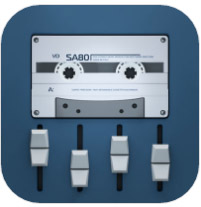Audio Units Support
Developers should also get access to Apple’s own audio plug-ins (something it promised and demoed at WWDC), but first it has to update them to support the new cross-platform Audio Unit Version 3. Audio plugins come in various formats to support loading in different digital audio workstations. When you are looking for new plugins to extend your digital audio workstation, you need to ensure that the plugin format is one that your digital audio workstation supports. Audio Units support state saving and multiple instances, and you can use them without having to switch between apps.” — Giel Bremmers, developer of MultitrackStudio, one of the first iOS apps. Audio Units (AU) are a system-level plug-in architecture provided by Core Audio in Apple's macOS and iOS operating systems. Audio Units are a set of application programming interface (API) services provided by the operating system to generate, process, receive, or otherwise manipulate streams of audio in near-real-time with minimal latency. Each pad can control an Audio Units plugin, or an external iOS app which supports Inter-App Audio or Audiobus protocols. To load a plugin or an app, go to the Editor view, select a pad and press the PLUGIN tab at the top-right corner of the editor. The plugin selection menu is displayed.
Samsung scx-4016 driver mac os x. yodot.com/images/yppt/ppt-repair-screen1.jpg' alt='Photo repair software for mac' title='Photo repair software for mac'> UAD Powered Plug-Ins are compatible with VST, RTAS, AAX 64, and Audio Units host DAW applications, and are widely used with a variety of major DAW software — including Pro Tools, Logic Pro, Cubase, Nuendo, Live, Sonar, and more. However, due to plug-in host differences between DAWs — and our own rigorous testing standards — Universal Audio only officially tests the with: • Avid Pro Tools 10*, Pro Tools 11, and Pro Tools 12 • Apple Logic Pro X • Steinberg Cubase 8 and Cubase 8.5 • Steinberg Nuendo 7 • Ableton Live 9 Notes: • *Pro Tools 10 is incompatible with Apollo Thunderbolt on Windows • Apollo Thunderbolt audio drivers for Windows are 64 bit only (32 bit DAW applications are not compatible) • The most recent maintenance release of the DAW application is recommended.
Audio Units Free

With iOS 9, Apple introduced a full-fledged audio plug-in framework for the first time on its mobile devices, allowing iPhone and iPad apps to implement support for third-party audio plug-ins just like on a Mac. In fact, the audio plugin framework comes in the form of, an updated version of the file type Apple has long used on the Mac for audio plug-ins in professional-class apps like. Now that iOS 9 is available to all, we took the feature for a test drive using a couple of the very first apps to update with support. The Audio Units extension framework is essentially an improved way to use audio apps, like effects and virtual instruments, within audio host apps, like Apple’s own GarageBand or other audio editing and mixing apps. Previously users had to use hacked together solutions, such as Apple’s inter-app audio feature or third-party solutions, to jump between apps and apply things like effects to another app running in the background. But with AUs, Apple lets audio plug-ins show up as a UI within another app, improving the workflow and making the experience much like what pros are used to on the Mac in apps like Logic Pro.
Audio Units Crossword
Here’s an example of the old Inter-App Audio way, which requires you to switch back and forth between a host app and the plug-in app (pictured below, left), vs the new and improved Audio Units plug-in way, which opens up the plug-in UI directly inside the host app (pictured below, right). Audio Unit plug-in Remaster open inside the Multitrackstudio app What’s required is apps to update with support: Editing apps like Garageband will get updates to become host apps, while effects and virtual instrument apps will need to update with support for being used as AUs in the host apps. And we’ll likely see companies that make AUs for the Mac bring standalone apps to the iOS App Store for use as audio plugins in host apps. With Audio Units version 3, source code for Audio Units on Mac will be identical for iOS and developers will only be required to optimize their plug-in for touch controls. “It’s great that 3rd party effects and instruments can now be integrated in MultitrackStudio without the problems associated with Inter-App Audio. Audio Units support state saving and multiple instances, and you can use them without having to switch between apps.” — Giel Bremmers, developer of, one of the first iOS apps to update with Audio Unit support, told us. Using Audio Units with iOS 9: Apple hasn’t updated GarageBand with the feature, despite having it at its Worldwide Developers Conference in June. Synnove williams. But you can try the feature thanks to a few third-party apps that have already implemented support.